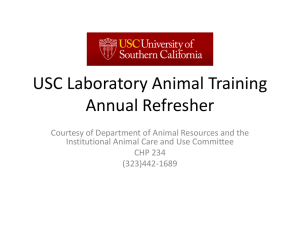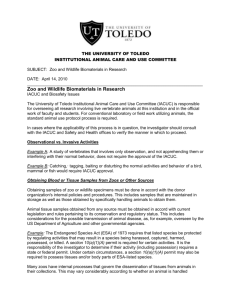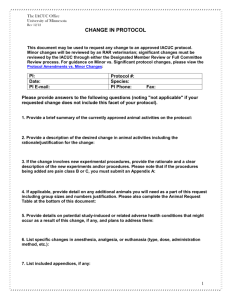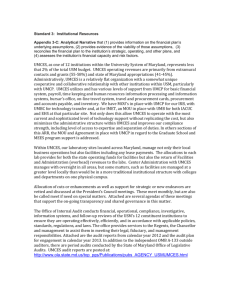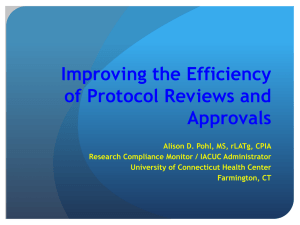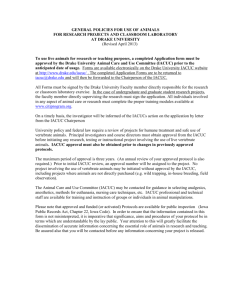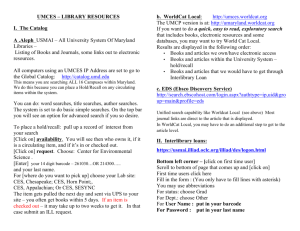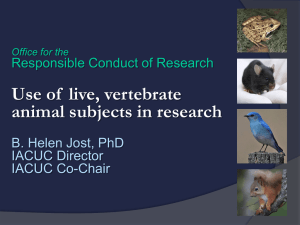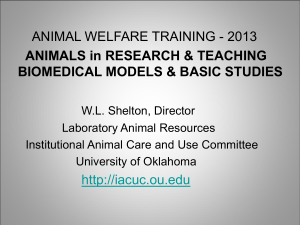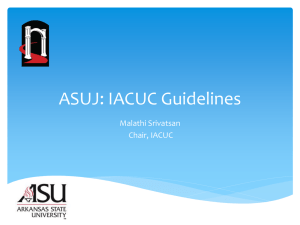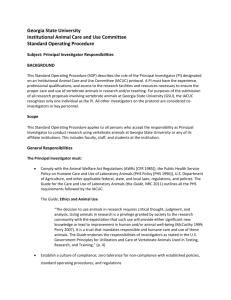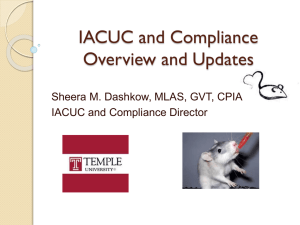Institutional Animal Care and Use Committee (IACUC) Field
advertisement
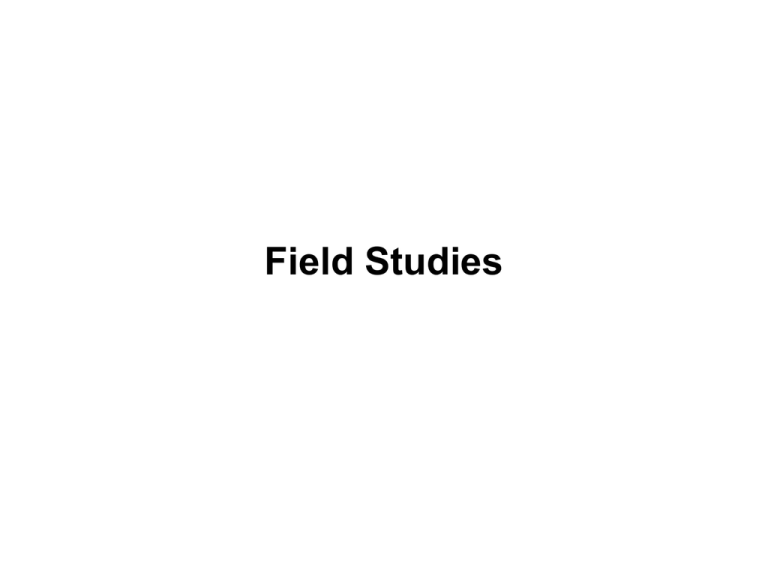
Field Studies "I'm a Field Biologist. Must I submit my protocol for IACUC review?" Federal regulations and Guidelines dealing with animal welfare focus mainly on biomedical and behavioral research, teaching, and testing that takes place in the LABORATORY. Yet, Institutional Animal Care and Use Committees (IACUCs) must ensure that ALL PROJECTS involving the use of live vertebrate animals comply with federal regulations and guidelines. So the question is asked, "Where do "Field Studies" fit in the regulatory puzzle?" Field studies must be reviewed by the IACUC in order to comply with our Institutional PHS Assurance. UMCES requires an IACUC review of all research, teaching and diagnostic protocols that involve the use of live vertebrates irrespective of source of funding (Departmental, Public, or Private) or purpose (Biomedical, Biological, Agricultural, Wildlife, Testing, Education, Diagnostics, etc.). In addition to being an UMCES requirement and a requirement of most funding agencies, it is expected by an increasing number of scientific journals for publication of your research. I Refer You to the Following 4 Guidelines Regarding Field and Lab work with vertebrates GUIDELINES FOR THE CAPTURE, HANDLING, AND CARE OF MAMMALS, American Society of Mammalogists www.mammalsociety.org/committees/commanimalca reuse/98iacucguidelines.pdf GUIDELINES TO THE USE OF WILD BIRDS IN RESEARCH, Ornithological Societies of North America www/nmnh.si.edu/BIRDNET/GuideToUse/Guidelines _2d_edition.pdf GUIDELINES FOR USE OF LIVE AMPHIBIANS AND REPTILES IN FIELD AND LABORATORY RESEARCH, Second edition, Revised by the Herpetological Animal Care and Use Committee (HACC) of the American Society of Ichthyologists and Herpetologists (ASIH), 2004. http://www.asih.org/files/hacc-final.pdf GUIDELINES FOR USE OF FISHES IN RESEARCH, American Fisheries Society, American Institute of Fishery Research Biologists, American Society of Ichthyologists and Herpetologists, 2004 http://www.fisheries.org/afs/publicpolicy/guidelines2004.pdf F. Other Useful Publications and Web Sites AMERICAN FISHERIES SOCIETY www.fisheries.org/afs/index.html FISHERIES TECHNIQUES, 2ND EDITION www.fisheries.org/afs/publications.html WILDLIFE SOCIETY www.wildlife.org TECHNIQUES FOR WILDLIFE INVESTIGATIONS AND MANAGEMENT, Edited by C. Braun (2006), 6th Ed. These Guidelines, in general, deal with multiple issues regarding handling and treatment of animals and should be consulted when preparing your proposal. These Guidelines are considered to be "Living Documents" and will be revised with continuing input from members of the various professional societies. These Guidelines are the primary means for the IACUC to evaluate field protocols. Researchers who are planning field studies might benefit by consulting one or more of these references. G. UMCES PHS Assurance States That Laboratory and manipulative experimental field studies of vertebrate animals are to be conducted only on finfish, amphibians and reptiles • Although fieldwork on fish, amphibians, and reptiles is referenced, field studies on birds and mammals are not mentioned in UMCES PHS Assurance. • However, field studies, as defined under the USDA AWA (e.g. non-invasive), would be permissible, subject to review, approval, and oversight by the UMCES IACUC. USDA Animal Welfare Act Definition of a Field Study which is permitted for birds and mammals under our IACUC: "Field study means any study done on free-living wild animals in their natural habitat, which does not involve an invasive procedure, and which does not harm or materially alter the behavior of the animals under study." Examples • • • • • Short term trapping for census Measuring weight or length Blood sampling—non-invasive or invasive? Collection of hair Identification, such as radio collars, tattoos, or ear tags • Behavioral observations • Mortality studies, e.g., road kills, bird and bat kills at tall buildings, towers, etc. • When designing field studies it is your responsibility to ensure that necessary federal and state permits are obtained in a timely fashion. IACUC Protocol Review does not free you from other regulatory requirements nor does acquisition of permits or approval from any management agency supersede IACUC Protocol Review Our Committee Welcomes Questions or Suggestions. Feel Free to Directly Contact Any Member of the UMCES IACUC UMCES IACUC Website: http://www.umces.edu/about/iacuc/
